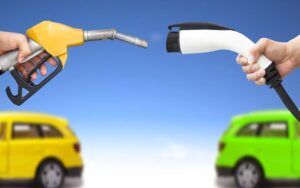Are you finding it difficult to choose whether to buy an electric or petrol vehicle? We have provided a side-by-side comparison between ev vs petrol vehicles. This comparison will help you select the best car for you and your dear ones.
Electric Vehicle
Any vehicle powered by electricity falls under the category of electric vehicles. Electric vehicles are powered by a powerful lithium-ion battery that helps propel the motors, making the vehicle move forward.
Petrol Vehicle
Petrol vehicles are powered by the combustion of fuel, generally petrol, gasoline, or LPG. The engine burns the fuel via spark ignition to propel the wheels forward.

Difference Between Electric Vehicle and Petrol Vehicle
We’ve created a table of comparisons between electric vehicle vs petrol vehicle. Check it out below:
| Feature | Electric Vehicle (EV) | Petrol Vehicle |
| Power Source | Electric motor powered by rechargeable battery. | Internal combustion engine powered by petrol/gasoline. |
| Emissions | Produces zero tailpipe emissions. | Produces significant greenhouse gas emissions. |
| Fueling/Charging | Charged with electricity at home or charging stations. | Refueled with gasoline/petrol at gas stations. |
| Running Costs | Lower running costs due to cheaper electricity rates. | Higher running costs due to fluctuating gasoline prices. |
| Maintenance | Less maintenance required (no oil changes, simpler engine) | More frequent maintenance required (oil changes, spark plugs, etc.) |
| Performance | Instant torque, good acceleration. | Power increases with engine RPM, and may require gear shifting. |
| Noise Level | Quieter operation due to electric motor. | Noisier operation due to engine combustion. |
| Upfront Cost | Generally higher initial purchase price. | Generally lower initial purchase price. |
| Range | Limited range on a single charge (typically 240-450 Kms). | Longer range on a full tank (typically 320-600 Kms). |
| Resale Value | May hold value better due to the increasing demand for EVs. | Resale value can vary depending on market conditions. |
| Availability of Charging Stations | Charging infrastructure is still developing, especially for public stations. | Gas stations are widely available. |
| Cost (Car) | ₹7 lakhs to ₹7.5 crores. | ₹3.5 lakhs to ₹248 crore. |
Pros and Cons of Electric Vehicles
Pros for Electric Vehicle
- Electric vehicles are the better option for environmental safety.
- Electric vehicles produce a negligible amount of noise.
- EVs have low maintenance costs due to simple moving mechanisms.
- Good resale value.
Cons for for Electric Vehicle
- The buying price of the electric vehicle is 2x to 3x more than a vehicle running on combustion.
- It takes hours to recharge the battery.
- Charging stations and infrastructure supporting electric vehicles are still under development.
- Not feasible for long itineraries.
Pros and Cons of Petrol Vehicle
Pros for Petrol Vehicle
- We have a well-developed infrastructure for petrol vehicles. Refuelling stations are available in every 5km range.
- Significantly lower buying price than EVs
- Suitable for long-distance travel.
- The service and maintenance charges are much lower and last longer than those of electric vehicles.
- Low resale value.
Cons for Petrol Vehicle
- Fuel prices increase constantly.
- Combustion vehicles require regular maintenance.
- It emits greenhouse gases that pollute the environment.
- Usually a lot noisier than electric vehicles.
Conclusion
Hopefully, you found this comparison between electric and petrol vehicles beneficial enough to make a further choice. If you constantly travel long distances, a petrol car will be a better option than a previous one. And if you need a vehicle to cover small routes in the city, buying an electric vehicle is a wiser option.
FAQs for Electric vehicle Vs Petrol vehicle
1. Electric Car Vs Petrol Car: Which is Better?
It depends on what you want it for, and several other factors may affect your buying decision. You can use a regular petrol vehicle daily if you’re on a tight budget. It’ll cost around 3.5 lakhs to 4 lakhs. If you have an extended budget, then there’s no harm in buying an electric vehicle. Again, if you are travelling longer distances, then it’s better to buy a combustion car.
2. How are Electric Cars Different From Petrol Cars?
The electric car uses the battery’s energy to propel the motor. It works by converting electric energy into mechanical energy. On the other hand, petrol cars move by combustion of fuels by engine.
3. Does Electric Car Have a Petrol Option?
Electric cars do not have fuel backup. However, some hybrid car models use both electricity and petrol, and these vehicles are also known as PHEVs (plug-in electric vehicles).
4. Do I Profit by Purchasing an Electric Vehicle In India?
Purchase an electric vehicle and benefit in several ways. You’ll enjoy a smooth journey, save money on fuel, and pay a higher initial price. Electric cars also have better resale value than petrol vehicles.
5. What is The Most Difficult Part of Owning an Electric Vehicle in India?
Charging the electric vehicle is the most challenging part you’ll face after buying an electric car.
Also, Read:
- Types of NGO in India
- Influential Popular Microblading Artists
- who is no 1 punjabi singer
- Best Courier Service Providers in India
- Today’s 14kt Gold Rate in Bangalore
